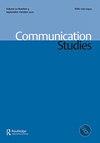“We’re Essential Because You’re Essential”: How Louisiana Sexual Assault and Domestic Violence Organizations Adapted Outreach Efforts and Health Messaging during COVID-19
IF 1.3
Q2 COMMUNICATION
引用次数: 0
Abstract
ABSTRACT Within weeks of the World Health Organization declaring the COVID-19 outbreak a global pandemic, domestic violence and sexual assault incidents increased. To adhere to new health protocols, social service providers were encouraged to move outreach efforts to virtual formats. We draw on 21 in-depth interviews with Louisiana organizations working in violence against women to examine how they 1) transitioned to online outreach efforts and 2) adapted their messaging to the COVID-19 context. We found that organizations who successfully moved to virtual efforts credited their success to thinking creatively and properly matching educational activities to digital media platforms, while those who struggled pointed to obstacles such as digital media fatigue and funding limitations (RQ1). We also identified three changes to message framing (RQ2): 1) Empathy and reassurance, especially, reiterating that centers “are there” for victims 2) Addressing racial justice issues, and 3) describing COVID-19 protocols and conducting lockdown-focused education efforts.“我们很重要,因为你很重要”:路易斯安那州性侵犯和家庭暴力组织如何在COVID-19期间调整外展工作和健康信息
摘要在世界卫生组织宣布新冠肺炎疫情为全球大流行的几周内,家庭暴力和性侵犯事件有所增加。为了遵守新的卫生协议,鼓励社会服务提供者将外联工作转向虚拟形式。我们对路易斯安那州从事暴力侵害妇女行为的组织进行了21次深入采访,以了解他们1)如何过渡到在线外联工作,2)如何将其信息适应新冠肺炎的背景。我们发现,成功转向虚拟工作的组织将其成功归功于创造性思维,并将教育活动与数字媒体平台适当匹配,而那些苦苦挣扎的组织则指出了数字媒体疲劳和资金限制等障碍(RQ1)。我们还确定了信息框架(RQ2)的三个变化:1)同理心和安抚,特别是重申中心“在那里”为受害者服务2)解决种族正义问题,3)描述新冠肺炎协议并开展以封锁为重点的教育工作。
本文章由计算机程序翻译,如有差异,请以英文原文为准。
求助全文
约1分钟内获得全文
求助全文

 求助内容:
求助内容: 应助结果提醒方式:
应助结果提醒方式:


